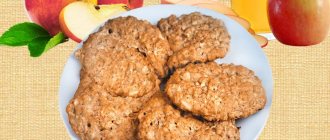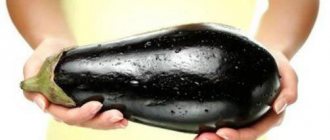Introduction of vegetables into the diet
If you regularly consumed bell peppers during pregnancy, your baby is likely already accustomed to its taste.
After all, the fetus swallows amniotic fluid, thus becoming familiar with the mother’s diet. Pediatricians say that foods consumed by pregnant women usually do not cause allergies in the baby. But you still need to monitor the baby’s reaction. If you have not been a fan of sweet vegetables before, start eating them no earlier than 3-4 weeks after giving birth. When introducing bell peppers into your diet while breastfeeding, use the recommendations.
- For the first time, choose a green vegetable - it is less allergenic. If the child does not develop rashes and his health does not deteriorate, you can safely try yellow and red varieties.
- To check your baby's reaction, try eating about 20-30 g - a quarter of a pod. Eat it during breakfast so that you can monitor your child’s reaction during the day.
- Be sure to prepare the vegetable - boil, stew or make stuffed peppers. Of course, it is not so healthy, but it also does not give mother’s milk a sharp, characteristic taste that babies do not like.
- Buy fresh peppers during their ripening season - late summer and early autumn. To preserve the vegetable for winter, you can freeze it. But you shouldn’t buy “plastic” processed fruits - it won’t bring any benefit.
- While breastfeeding, mothers can consume no more than 200 g of bell pepper per week.
When breastfeeding, it is best to consume no more than 200 grams of cooked green bell pepper per week.
If you introduce pepper into the menu gradually, you will be able to replenish your body with vitamins and minerals without negative consequences for the baby.
Is it acceptable to include it in a child’s diet?
The use of pepper in a baby's diet is very important. After all, this product is rich in various vitamins. It is better to use bell pepper and prepare various dishes from it. Do not use black or hot pepper in your baby’s diet.
From what age?
It is not recommended to give fresh, raw pepper to your baby. Because this can cause bloating and gas formation. If there are no contraindications, you can start giving pepper from 10 months, but it must be heat-treated. Roasted peppers without the skin are best.
If we talk about fresh pepper, then it should be given to children after 2 years. It's also worth starting with green and yellow peppers. If the baby has problems with intestinal function, you need to introduce pepper into the diet very carefully and in small quantities. Various oils found in peppers can increase gastrointestinal irritation .
In any form?
During the first feeding, it is best to use baked peppers. You can also grind it into puree. Goes great with boiled potatoes. This creamy dish will be a great snack for your baby. It is better to use yellow pepper for this puree.
If the child has already started eating solid foods, peppers can also be given stuffed with vegetables or rice. In small quantities. It is necessary to give such puree in very small quantities, constantly monitoring the baby’s reaction.
Advice! Before you start feeding bell peppers, you should consult your pediatrician.
How is it good for kids?
Pepper is very beneficial for children in their diet.:
- It contains vitamins, folic acid, beta-carotene.
- Necessary carbohydrates for children, which promotes growth and normal development. Increases appetite and gives energy and vigor to the baby.
- It affects the functioning of the intestines; pepper is able to absorb negative toxins and harmful additives.
- Pepper contains useful microelements:
- potassium;
magnesium;
- iron;
- and many others.
They are able to suppress inflammatory processes and improve the functioning of the immune system.
Recipe
One of the most popular and favorite dishes is stuffed peppers. But this delicacy will be most useful if you use minced vegetables instead of meat.
You will need:
- 5 medium peppercorns;
- carrot;
- 2 onions;
- a glass of low-fat sour cream;
- cheese to taste;
- 25 g vegetable oil.
How to cook:
- Wash the pepper and carefully remove the internal membranes along with the seeds so as not to damage the vegetable.
- Cut up ingredients for filling. Fry the vegetables in a frying pan.
- Grease a baking sheet with oil.
- Stuff the peppers with minced vegetables and place on a baking sheet.
- Pour sour cream diluted with a small amount of water on top.
- Sprinkle with grated cheese.
- Bake in the oven for about 40 minutes.
- The finished dish can be sprinkled with chopped herbs.
Recipe for a dish with pepper for nursing mothers
The most popular bell pepper dish remains stuffed vegetables. Vegetable products, cereals, minced meat, etc. are used as filling. But an equally tasty stew is prepared from pepper, which will saturate the body with useful substances and help maintain your figure. Let's get acquainted with these recipes.
Stuffed pepper
Prepare the ingredients:
- 0.5 kg minced meat;
- 1 carrot;
- 150 g boiled rice;
- 1 onion;
- 7-8 peppers;
- 70-80 g sour cream for dressing.
Preparation:
- Peel plant foods other than peppers.
- Wash and cut into cubes.
- Fry in oil.
- Mix rice with minced meat and vegetables.
- Salt and add seasonings to taste.
- Remove the center from the peppers so as not to damage the walls of the fruit.
- Stuff the vegetables with minced meat and place in a saucepan.
- Mix sour cream with water and pour over the mixture.
- Simmer the stuffed peppers for 45 minutes.
Instead of sour cream, you can use diluted tomato juice if your child is not allergic to tomatoes. If you follow a vegetarian diet, use vegetables instead of minced meat.
Vegetable stew
You will need:
- 0.5 kg potatoes;
- 3 carrots;
- 1 zucchini;
- 1 onion;
- 2 peppers;
- 0.5 kg of cabbage (if this vegetable causes bloating, take it in smaller quantities or exclude it from the dish).
Preparation:
- Peel the ingredients, wash and cut into small cubes.
- Fry each vegetable separately.
- Place the ingredients in a saucepan or saucepan.
- Add a quarter glass of water and simmer for half an hour, covering the dish with a lid.
- Add finely chopped herbs or sour cream to the finished stew.
The dish does not require any effort and is suitable for mothers living under time pressure.
Specifics of spices and seasonings
Spices and seasonings are responsible not only for taste, but also have an effect on the body. This impact can be both positive and negative. Such additives affect digestion and activate material metabolism, suppress pathogenic microflora in the intestines, and saturate the body with vitamins and minerals. At the same time, they increase body temperature, can provoke allergies and poisoning, and lead to a lack of fluid and excess salts in the body.
Spices and seasonings perform the following useful functions:
- Stimulate material metabolism and improve the process of fat breakdown;
- Improves digestion and digestion of food;
- Remove toxins, cleanse and tone the body;
- They improve mood and help a nursing mother cope with depression;
- Improves the taste and aroma of food;
- Strengthen the immune system and effectively fight colds, viruses, microbes;
- Prevents inflammatory processes;
- Reduce the harm of carcinogens;
- Slow down the aging of the body;
- Normalize blood sugar levels and accelerate blood circulation;
- Helps with oral infections and skin diseases.
However, spices and herbs are highly allergenic and dangerous in large quantities. Abuse of seasonings can worsen digestion, cause various diseases of the stomach, kidneys and liver, develop food allergies, ulcers, pancreatitis or gastritis, and asthma.
In large quantities, spices lead to dehydration, which impairs lactation. Sage is especially dangerous, as it negatively affects milk production. Therefore, this herb is used to complete breastfeeding. Rosemary and saffron cause convulsions, and cloves cause excessive lethargy and drowsiness. Curry, chili, red pepper and other hot seasonings can cause poisoning, increase colic in infants, disrupt bowel movements, and burn the intestines. So, babies experience diarrhea or constipation, vomiting, and severe abdominal pain.
What are the benefits for breastfeeding?
Bell peppers contain a whole group of vitamins and minerals. They determine the value of the product for a nursing mother, since the product:
- Improves vision. There is no less vitamin A in peppers than in carrots. With regular use, visual acuity increases.
- Strengthens the immune system, prevents the development of cancer. The vegetable contains a lot of ascorbic acid, which is a powerful antioxidant.
- Promotes normal development of the child's nervous system. Peppers include vitamin B9 (folic acid). This compound affects the formation of the baby's brain.
- Helps maintain your figure. 100 g of pepper contains only 27 kcal. If mommy wants to be slim, then vegetable dishes will help her maintain a stable weight.
- Activates digestion and prevents constipation. The product includes fiber and niacin. They improve the functioning of the gastrointestinal tract and enhance peristalsis.
- Promotes hematopoiesis, improves blood circulation. Pepper contains a lot of phosphorus, which affects these processes.
- Strengthens nails, hair, teeth. Red peppers are a recognized source of calcium. The compound is necessary for the mother to maintain her health and the formation of the baby’s bone tissue.
- Bell pepper makes the walls of blood vessels less permeable, thins the blood, and prevents the formation of blood clots.
The product does not affect lactation, but saturates milk with useful substances and makes it nutritious.
Stewed tomatoes with vegetables
Ingredients:
- tomatoes – 4 pcs.;
- potatoes – 4 pcs.;
- bell pepper – 1 pc. ;
- zucchini – 1 small;
- onion – 1 pc.;
- black pepper;
- salt;
- vegetable oil – 2 tbsp;
- greenery.
Cooking method:
- Place the tomatoes in boiling water for 30 seconds, remove them and remove the skins.
- Cut the tomato into cubes.
- Finely chop the bell pepper and onion.
- Peel the zucchini and remove seeds and cut into cubes.
- Pour vegetable oil into the pan and add all the vegetables.
- Pour enough water to cover the vegetables.
- Let it simmer over low heat for 20 minutes. The lid must be closed. We determine readiness by looking at the potatoes.
- 5 minutes before readiness, add salt and pepper.
- At the end, sprinkle with herbs.
The dish is served both hot and cold.
Possible harm
Due to its composition, bell pepper is definitely beneficial for both mother and child. It can become dangerous only due to the high content of pesticides if it was grown with the addition of chemicals.
Important! It is advisable to use bell peppers grown in your own garden. If this is not possible, then purchased fruits should be kept in cold water for an hour before cooking in order to get rid of pesticides
Contraindications to the use of bell pepper due to the content of fiber and essential oils may be:
- tendency to allergies;
- diseases of the gastrointestinal tract (gastritis, ulcers, low acidity);
- liver and kidney diseases.
Is it possible to eat red peppers while breastfeeding?
The most important principle of lactation and mother’s nutrition is that everything that a nursing woman eats ends up in her milk one way or another. For this reason, a strict diet after childbirth is necessary, aimed at ensuring that the newborn baby suffers as little as possible from allergic rashes or abdominal pain.
It’s not for nothing that spices and seasonings belong to a special category of products. Each of them has its own special properties and affects the body of the person who eats them. For example, there are spices that can enhance the production of breast milk in a nursing mother. And there are those that work the other way around - they suppress lactation.
Red hot pepper can rather be classified as a neutral seasoning, because it does not have too much of an effect on GV. But the negative effect on the baby after a pinch of chili pepper eaten by the mother can be enormous, because this type of seasoning is quite allergenic.
This is largely due to the very shade of pepper.
Any plant products that have a bright color (orange, red, etc.) have a high concentration of natural dyes. And they, in turn, cause food allergies in young children.
That is why in the first month of breastfeeding, doctors recommend giving up all vegetables and fruits that nature has painted in bright colors.
In addition to natural allergens, red hot pepper is also rich in special substances - essential oils, which imbue the product with such a pungent taste and aroma.
Of course, even as a precaution, a young mother should not add components to her food that can significantly affect the taste or composition of breast milk
For a number of good reasons, red chili pepper should not be consumed by a nursing woman during lactation. Moreover, it is unwise to do this in the first months of breastfeeding, when the body of a newborn baby reacts sharply to any changes in the mother’s menu. Even a small amount of such seasoning in such an early period after childbirth can cause a deterioration in the child’s physical well-being.
In general, experts recommend refraining from hot and overly spicy seasonings until the end of the breastfeeding period. However, occasionally doctors allow a young mother to diversify her dishes with chili pepper if the baby eats complementary foods most of the day. In this case, the risk of dangerous spices and substances from it getting into breast milk is significantly reduced. In addition, by the time of the first half of the year, most babies already have a formed immune system that is not so sensitive to allergens.
For other nursing women, any very hot pepper, especially red pepper, remains prohibited. You cannot add this spice to food if the baby is still entirely breastfed. Moreover, you should not overuse the amount of herbs and seasonings in your dishes.
Diet of a nursing mother
During pregnancy, doctors recommend eating foods that contain sufficient amounts of minerals and vitamins. Of course, these are vegetables and fruits, which are a kind of supplier of microelements necessary for the body. However, among the variety of products offered, you should choose those whose consumption will not negatively affect the health of the young mother and her baby.
With mother's milk, all the necessary elements enter the baby's body, which contribute to the growth and full development of the toddler. The diet of a nursing mother should be hypoallergenic, but at the same time as balanced as possible. It is worth noting that boiled vegetables can be consumed in almost everything, especially since there are no contraindications.
What to cook from bell pepper during gw?
- cut the pepper into strips,
- salt a little and add olive oil.
Believe me, it will be delicious.
Stuffed pepper
You can stuff it with either minced meat or vegetables.
It will be very useful for a nursing mother if you cook peppers stuffed with vegetables in the oven. To prepare you will need:
- pepper – 10 pcs.;
- carrots – 2 pcs.;
- onion heads – 3 pcs.;
- white cabbage – 500 gr.;
- sour cream – 250 gr.;
- cheese – 200 gr.;
- butter – 50 gr.
Let's start cooking:
- We clean the pepper and cut out the core from it.
- We clean and cut the vegetables.
- Next, fry the onion and add carrots to it.
- When everything is fried, add cabbage and simmer everything.
- After 20 minutes the minced meat is ready.
- Afterwards, grease the baking sheet with oil.
- Fill the peppers with minced meat and place on a baking sheet.
- Drizzle with sour cream.
- For juice, add water. Sprinkle everything with cheese on top.
- Preheat the oven, put everything in the oven and bake.
- After everything boils, cook in the oven for another 40 minutes.
- Remove from the oven and enjoy your meal!
During lactation you need to eat very well. But always eat with pleasure. There is no need to deliberately force yourself to eat something that you don’t want to eat at all.
Everything should be a pleasure. Everything for the pleasure of the mother and her baby.
- Can a nursing mother eat tomatoes?
- Can a nursing mother eat eggplant?
- Nutrition during breastfeeding - about different approaches and ways to introduce new foods into the diet.
Peppers stuffed with vegetables in the oven
Ingredients:
- peppercorns of the same small size - 10 pcs.,
- bulbs – 2 pcs.,
- carrots – 2 pcs.,
- white cabbage – 0.5 kg,
- sour cream – 1 glass,
- hard cheese – 150 g,
- butter – 1 tablespoon.
The peppers need to be washed and the core carefully cut out so that they remain intact. Sauté finely chopped onion and grated carrots in oil. Then add shredded cabbage and simmer covered for about 30 minutes until all the vegetables become soft. Add salt at the very end.
Stuff the peppers with the resulting filling and place in a greased deep frying pan, roasting pan or baking sheet. Pour in sour cream, add a little water, sprinkle with grated cheese on top. Place the bowl with pepper in a preheated oven and keep there for 40-45 minutes until fully cooked.
Stuffed peppers are made not only with vegetables, but also with meat. Lean beef, veal, rabbit, turkey, and chicken are suitable for this. You can try mixed minced meat - from vegetables and some type of meat.
Can a nursing mother eat red bell peppers and what are their benefits?
Bell pepper is a frequent guest on our tables. Salads are prepared with this wonderful vegetable, main courses are served with it, and twists are made with it. Therefore, it is not surprising that it is so popular, including among nursing mothers.
However, many women are confused by the fact that most of the year sweet peppers are brought from afar. In our latitudes, its season does not last long. In addition, the bright color of vegetables and fruits usually indicates high allergenicity. Is this really true?
In fact, pediatricians are extremely loyal to bell pepper - it is even included in the category of recommended products. However, this applies only to seasonal vegetables, and not to imported products.
It should also be noted that specifically red bell peppers still often become the cause of a negative reaction in the baby. For this reason, its introduction into the diet of a nursing mother is carried out after the introduction of the white and orange varieties of the vegetable.
However, red sweet pepper has undoubted advantages - the concentration of nutrients in it is several times higher than in other similar vegetables. For example, it contains 5 times more vitamin A than white pepper.
This vegetable has a lot of other beneficial properties, let's look at them in more detail.
- In terms of carotene content, bell peppers are similar to carrots. Thanks to this substance, the vegetable has a beneficial effect on eye health. Pepper can increase visual acuity and also prevent the development of many eye diseases.
- It is also extremely important that sweet peppers contain a significant amount of vitamin C. This substance is an antioxidant, which means it prevents such a terrible disease as cancer. Vitamin C is also known for its ability to strengthen the immune system. Thanks to this, the body of mother and baby better resists any diseases and recovers faster from them.
- Bell peppers contain such an amazing substance as folic acid. This compound ensures the active development of the child and strengthens the health of his nervous system.
Mothers who are trying to lose excess weight after pregnancy should pay attention to this vegetable. Pepper contains slow carbohydrates that take a long time to be digested by the body and are not stored as fat.
- Niacin, also present in the flesh of bell peppers, is a B vitamin that helps with digestive health. Considering that this vegetable is also rich in fiber, its regular consumption can significantly affect the quality of digestion in general. Sweet peppers bring particular benefits to the intestines - they function better, and their walls absorb nutrients better.
- A distinctive feature of red bell pepper is the presence of anti-inflammatory substances in it. Such compounds are not found in white vegetables, so eating the red variety is much preferable.
- The phosphorus in red peppers helps normalize blood circulation. Thanks to this trace element, blood vessels throughout the body relax and blood flow improves. Indirectly, this helps milk production and improves the quality of lactation in general.
What are the benefits of green bell peppers during lactation?
Any sweet pepper contains a whole arsenal of useful substances, and among them there are such important vitamins as ascorbic acid, vitamins B and P, as well as the minerals iron, potassium and iodine. Thanks to this, the vegetable is especially necessary for young mothers, who often suffer from colds due to reduced immunity.
- Green pepper is very useful for female beauty, since its active natural substances regulate the condition of the skin of the body and face, as well as hair and nails.
- If you eat the product often enough, you can improve the appearance and thickness of women's hair, which is especially valuable for women who breastfeed their babies.
- Sweet green pepper is the basis for the proper function of the cardiac system, since vitamin P, which is part of the vegetable, significantly reduces the risk of heart attacks and stroke.
The product can be recommended as a natural and safe ingredient to prevent the worsening of varicose veins after childbirth.
The biologically active substances of green pepper have a positive effect on the emotional background of a young mother and also help normalize sleep. We can say that regular consumption of vegetables allows you to insure yourself against postpartum depression, which often manifests itself during breastfeeding.
Is it possible for a nursing mother to stuffed peppers?
Large, aromatic peppers stuffed with meat or vegetables are one of the most favorite summer dishes, which often appears on the table already in the middle of summer. There are many recipes for stuffed peppers; each family prepares it differently. But can a nursing mother afford at least a small portion of this dish? Will it harm the health of the baby? Let's figure it out!
First of all, we note that stuffed peppers are not only a bright summer vegetable, but also a meat filling to which spices and seasonings are added. Meat is one of the most necessary products in the diet of a nursing mother. It serves as the main source of proteins and essential amino acids, and supplies the body with iron, which is necessary for the prevention of iron deficiency anemia.
Eating meat allows a woman to recover faster after childbirth and withstand the considerable stress that is inevitable in the first months of a baby’s life.
However, if we stuff peppers for a nursing mother, there are special requirements for the filling:
In the first months of breastfeeding, it is better to use chicken fillet, chopped at home, for the filling. You will have to stop using ready-made minced meat for the first months of breastfeeding. Homemade meat contains a minimum of fat, which means it will be easily digestible and will not create additional stress on the body of mother and baby. As a rule, in addition to meat, minced meat contains a little rice
For a nursing mother, the use of this cereal is quite acceptable; the main thing you need to pay attention to is the quality of the product. The use of onions, herbs and spices requires special attention. It is not recommended for a nursing mother to consume products with a strong odor - they can impart an unusual odor to breast milk.
This means that in our case it is necessary to limit ourselves to a symbolic amount of raw onion and black pepper.
Other types of peppers for breastfeeding
As for other types of peppers, such as hot peppers, chilies and other “thermonuclear” ones, you should not eat them while breastfeeding. This way you can turn your baby away from the breast, because the milk will acquire an unpleasant bitter taste.
Often women after childbirth are recommended to use water pepper. Do not be confused: this is an aqueous extract of the peppermint plant, which is indicated for uterine bleeding, heavy menstruation, hemorrhoids, and an atonic uterus. In particular, this drug promotes active contraction of the uterus during the postpartum period. Is it possible for breastfeeding? The annotation states that yes, but in a minimal dosage and taking into account contraindications.
With the right approach, a nursing mother’s diet will not consist of only restrictions. If the baby’s health allows, you can and should expand the menu to include your favorite foods.
List of contraindications
- hypertension;
- ischemic disease;
- chronic pathologies of the kidneys and liver;
- haemorrhoids;
- peptic ulcer;
- gastritis with high acidity;
- colitis.
Special attention! Chronic processes like to remind themselves when the body is especially defenseless. And pregnancy and childbirth take a lot of strength and resources from a woman
Therefore, an unwanted product, even in minimal quantities, can become a serious problem.
To summarize, I would like to draw your attention to one more interesting point: if you want to diversify your diet with bell peppers in winter, you can put some selected vegetables in the freezer. By putting into practice the simple rules listed here, you can enjoy a variety of vitamins all year round, even for nursing mothers
The benefits of bell pepper
Most women during lactation are interested in whether bell pepper is beneficial or harmful when consumed.
Regular addition of sweet pepper to dishes is very useful: the product has a beneficial effect on the circulatory and immune systems, and prevents the development of thrombosis. Also, the positive properties of this vegetable include:
- improving the digestion of food in a baby, eliminating colic;
- stimulation of hair growth, prevention of hair loss and fragility;
- improvement of the condition of the dermis and visual organ;
- removal of harmful compounds from the body;
- reducing the likelihood of breast and ovarian cancer;
- eliminating fatigue, insomnia, providing the body with energy;
- improvement of the functioning of the central nervous system and pancreas.
In addition, bell peppers contain minimal calories and sugar compounds, so women with diabetes can eat them.
Is it possible for a nursing mother?
It is believed that bell pepper has an average level of allergenicity, so it cannot be completely classified as one of those products that are absolutely indicated for breastfeeding. However, a nursing mother should not completely exclude such a valuable vegetable. You just need to study the necessary recommendations given by experts and adhere to them:
READ ALSO: What vegetables can a nursing mother eat in the first month?
- If you are breastfeeding, avoid eating bell peppers for the first 3 months. When the baby is at high risk of allergies, increase this period to 4-5 months.
- Eat your favorite vegetable only in the season when it ripens naturally. Winter fruits from greenhouses, grown with the use of growth stimulants, are completely unsuitable for a mother who is breastfeeding (more details in the article: is it possible to eat chicken hearts while breastfeeding?).
- Steam or stew the peppers. If the child’s digestion responds well to it, after a while you can try it raw.
- When introducing a new vegetable into your diet, start with yellow or green fruits - they contain fewer allergenic substances. If your baby doesn't have a reaction, you can add red and orange ones.
- The first use of a new food component should be in the morning and on an empty stomach - this will make it easier for you to track the reaction of the child’s body. Make a small portion - about 20 g.
- When pepper has already been introduced into the diet along with other products, still adhere to the recommended dosages. When cooked, you should eat up to 200 g per week, and raw - only 150 g.
- Try not to buy vegetables imported from distant countries, or grown in large quantities in greenhouses. What is grown for sale is replete with harmful additives. Give preference to vegetables grown on your own plot or bought from your grandmother in the neighborhood.
READ ALSO: What foods can you eat while breastfeeding?
How to choose the right vegetable?
When choosing sweet bell peppers, you need to ask the seller about the place where they are grown. Greenhouse and imported vegetables, as a rule, contain chemical compounds that are harmful to human health. It is recommended to give preference to fruits grown at home or on the farm. In addition, you should buy peppers only during the harvest season (summer or autumn). In spring and winter, chemical additives are used to grow fruits.
For a woman during breastfeeding and a baby, the color of the chosen vegetable is of no small importance. It is better to buy green peppers, since red and orange ones contain a large amount of allergic substances. You should also pay attention to the appearance of the product. The surface of the fruit should be smooth, without any dark inclusions or cracks, and the structure should be strong.
How compatible are breastfeeding and bell peppers?
It is clear that this question cannot be answered unequivocally, because much is decided by the individual characteristics of the mother’s body. Since pepper belongs to the group of products with a moderate degree of allergenicity, not all mothers can consume it. But even in the absence of visible risks, you should adhere to the following expert recommendations when including this garden crop in your diet:
- You should not include pepper in a nursing mother’s menu until the baby is 3 months old. The optimal period is 4-5 months.
- It is better to eat the vegetable during its ripening season, since winter fruits grow in greenhouse conditions, and special chemical additives are used there to stimulate plant growth. Such components will only harm mother and child.
- First you need to try the vegetable boiled or stewed. If your baby does not develop any intestinal problems after this, you can try eating some raw pepper.
- Color matters. To begin with, you should select yellow and green specimens - they are less allergenic. When the child gets used to the innovations, you can try eating red pepper.
- Dosage is the main point that must be followed strictly. You need to start with a small slice, 20 grams, gradually increase the portion as the child gets used to it. But even when bell pepper becomes a familiar product on your mother’s menu, you shouldn’t overuse it. You can eat up to 200 grams per week in cooked dishes and only 150 g fresh.
Important point!
You should immediately refuse to purchase vegetables imported from abroad. Peppers purchased from grandmothers at the market will be much healthier for mom.
When and in what quantity can a nursing mother try bell pepper?
Since bell peppers do not contain any substances that make them spicy, nursing mothers are allowed to eat them quite early. White bell peppers are allowed to be tasted when the child reaches three months of age .
The red variety is introduced a little later - after a couple of weeks and only if the baby did not have an allergy the first time.
Pediatricians advise consuming no more than 100 grams of the product per day, and you can eat red pepper no more than 3-4 times a week.
The procedure for introducing this vegetable is standard. To begin with, a nursing mother can eat one small piece of pulp. It is better to do this in the first half of the day before feeding, so that you can immediately notice the baby’s negative reaction.
If its main symptoms do not appear within 24 hours, then the child’s body reacts normally to this vegetable and the pepper can be eaten without fear. Otherwise, the introduction of bell pepper is postponed for a month and the attempt is repeated.
Spices and seasonings during lactation
A nursing woman should be very selective about her diet. Some components can negatively affect lactation and the well-being of the baby. This also applies to spices. Many types of herbs suppress or, conversely, increase the production of breast milk. These are very allergenic products. In addition, in large quantities they can change the color and even taste of milk.
To protect yourself and your baby, in the first month of lactation you should only consume salt, then you can add black pepper to your dishes. After three months, you can try new types of seasonings, including herbs. Bay leaves, green onions, white and black pepper, and dried herbs are considered the safest to feed. If the child does not have allergies, after six months you can eat cinnamon, vanilla, garlic, basil, celery, and onions. For more information on what kind of greens a nursing mother can eat, see here.
In any case, you can use seasonings only in small quantities, no more than 4-5 grams per dish. Give preference to fresh and natural spices. It’s good if you prepare your own seasonings and spices and dry herbs. Under no circumstances use ready-made powder mixtures or products with generic names such as Provençal herbs, seasonings for fish or meat. They contain a large number of harmful chemical additives, flavors and dyes, which is very dangerous for the health of children and adults.
Do not overuse or use spices too often. Do not use too spicy components and ingredients that lead to dehydration and worsening lactation. You should not use spices if you have cystitis and asthma, stomach problems, or if the mother or baby is prone to allergies. Let's take a closer look at what seasonings and spices can be used during breastfeeding without harm to lactation and the baby.
Seasonings with red and black pepper during lactation
In addition to the sweet vegetable, seasonings from hot varieties of pepper - red and black - are widely used in cooking. Products have a beneficial effect on health if added to dishes in a minimal amount. During lactation, treat them with caution and do not abuse them.
When is it possible?
Adding hot spices to food is allowed from 2 or 3 months after birth. A nursing mother should first test by placing black or red pepper on the tip of a knife in a soup or side dish.
If the child does not have a negative reaction, season the dishes, but carefully. Spicy food is dangerous because the bitter taste of the milk will cause the baby to refuse breastfeeding.
Benefit
Ground spicy varieties of vegetables emphasize the taste of dishes and activate metabolism. Seasonings include vitamin A, phosphorus, calcium, esters and other beneficial compounds. Thanks to them, spices have a beneficial effect on the body:
- promote food digestion;
- stimulate appetite;
- make blood less viscous;
- normalize hormonal levels;
- activate the breakdown of fats and prevent them from being deposited in the body;
- increase immunity;
- inhibit pathogenic microbes;
- stimulate the release of sputum in diseases of the respiratory system;
- prevent the formation of oncology;
- thin the blood;
- remove cholesterol;
- tone, stimulate brain function.
The beneficial properties of the products “work” if the mother uses seasonings in moderation and carefully monitors the health of the newborn.
Contraindications
It is strictly forbidden to add hot spices to dishes if you have the following conditions and diseases:
- anemia and low hemoglobin;
- product intolerance;
- gastrointestinal diseases;
- haemorrhoids;
- pathologies of the liver and kidneys.
Before eating pepper, consult your doctor: many hidden diseases become more active after childbirth.
How does it affect lactation?
Black or red pepper does not stimulate or reduce milk flow. However, they can affect its taste. If mommy overuses spicy foods, the milk will take on an unpleasant aftertaste. Having felt it, the baby may begin to be capricious or refuse to feed.
Impact on the child
If you add hot spices to food in large quantities, this will negatively affect the child’s condition:
- the baby develops an allergic reaction in the form of a skin rash, runny nose, and tearfulness;
- hemoglobin decreases, which leads to anemia in the baby;
- colic appears, flatulence develops, and digestion is upset.
Like any product, pepper can be a medicine or cause harm. The outcome of the situation depends on the amount of product eaten and compliance with the rules for introducing it into the diet during the feeding period. The vegetable provides women and children with essential vitamins and minerals. But only when the product is of high quality and its use is strictly dosed.
Vitamin composition of red cayenne pepper: what is rich in hot spice
If your pediatrician allowed you to season your food with a pinch of hot pepper, then it’s worth knowing what beneficial substances are hidden in its powder or in the pods themselves. For example, it is thanks to such a bright shade that the spice can boast of a huge amount of carotene.
Red hot pepper also contains vitamin PP, as well as vitamins B5 and B6, B1 and B2, which are responsible for many metabolic processes in the body and for female beauty in particular. The most abundant vitamin C in the cayenne pepper pod is ascorbic acid. And this, as you know, is the most important element for good health. The chemical composition of pepper also includes vitamin E and A.
In addition, microelements can be found in the chili pod - another essential element for humans. Hot peppers are rich in iron and selenium, manganese and zinc, calcium and copper, as well as potassium and phosphorus.
Since it is risky to eat this kind of spices during lactation, beauty recipes are most often prepared on their basis.
Red pepper powder can be used to make homemade hair masks to strengthen your hair and awaken dormant hair follicles. Chili is often added to the wrapping mixture, since hot pepper perfectly warms the skin and helps to lose weight faster.
If you are still in doubt about whether you can use red pepper while breastfeeding, it is better not to take risks or tempt fate. Take care of the well-being of your newborn baby and put this seasoning aside until the child is a little older.










